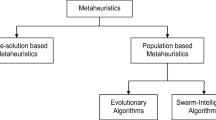Abstract
Differential evolution (DE) has been shown to be a simple, yet powerful, evolutionary algorithm for global optimization for many real problems. Adaptation, especially self-adaptation, has been found to be highly beneficial for adjusting control parameters, especially when done without any user interaction. This paper presents differential evolution algorithms, which use different adaptive or self-adaptive mechanisms applied to the control parameters. Detailed performance comparisons of these algorithms on the benchmark functions are outlined.
Similar content being viewed by others
References
Ali MM Törn A (2004) Population set-based global optimization algorithms: some modifications and numerical studies. Comput Operat Res 31(10):1703–1725
Bäck T (2002) Adaptive business intelligence based on evolution strategies: some application examples of self-adaptive software. Inf Sci 148:113–121
Bäck T, Fogel DB, Michalewicz Z (1997) Handbook of evolutionary computation. Institute of Physics Publishing and Oxford University Press, New York
Brest J, Greiner S, Bošković B, Mernik M, Žumer V (2006) Self-adapting control parameters in differential evolution: a comparative study on numerical benchmark problems. IEEE Trans Evolut Comput (in press)
Di Nola A, Gerla G (2001) Lectures on soft computing and fuzzy logic. Series: advances in soft computing. Springer, Berlin New York
De Jong KA (1975) An analysis of the behavior of a class of genetic adaptive systems. PhD Thesis, University Michigan
Eiben AE, Hinterding R, Michalewicz Z (1999) Parameter control in evolutionary algorithms. IEEE Trans Evolut Comput 3(2):124–141
Eiben AE, Smith JE (2003) Introduction to evolutionary computing Natural Computing. Springer, Berlin Heidelberg New York
Gämperle R, Müller SD, Koumoutsakos P (2002) A study for differential evolution. In: Proceedings WSEAS international conference on advances in intelligent systems, fuzzy systems, evolutionary computation, pp 293–298
Hansen N (2005) Compilation of results on the CEC~benchmark function set. http://www.ntu.edu.sg/home/epnsugan/ index_files/CEC05/compareresults. pdf
Lee CY, Yao X (2004) Evolutionary programming using mutations based on the Lévy probability distribution. IEEE Trans Evolut Comput 8(1):1–13
Liu J, Lampinen J (2002a) Adaptive parameter control of differential evolution. In: Proceedings of the 8th international conference on soft computing (MENDEL 2002), pp 19–26
Liu J, Lampinen J (2002b) On setting the control parameter of the differential evolution method. In: Proceedings of the 8th international conference on soft computing (MENDEL 2002), pp 11–18
Liu J, Lampinen J (2005) A fuzzy adaptive differential evolution algorithm. Soft Comput Fusion Found Methodol Appl 9(6):448–462
Price K, Storn R (1997) Differential evolution: a simple evolution strategy for fast optimization. Dr. Dobb’s J Softw Tools 22(4):18–24
Price K, Storn R, Lampinen J (2005) Differential evolution, a practical approach to global optimization. Springer, Berlin Heidelberg New York
Qin AK, Suganthan PN (2005) Self-adaptive differential evolution algorithm for numerical optimization. In: The 2005 IEEE congress on evolutionary computation CEC2005, pp 1785–1791 DOI 10.1109/CEC.2005.1554904
Rönkkönen J, Kukkonen S, Price K (2005) Real-parameter optimization with differential evolution. In: The 2005 IEEE congress on evolutionary computation CEC2005, pp 506–513
Storn R, Price K (1995) Differential evolution – a simple and efficient adaptive scheme for global optimization over continuous spaces. Technical Report TR-95-012, Berkeley
Storn R, Price K (1997) Differential evolution – a simple and efficient heuristic for global optimization over continuous spaces. J Global Optim 11:341–359
Suganthan PN, Hansen N, Liang JJ, Deb K, Chen Y-P, Auger A, Tiwari S (2005) Problem definitions and evaluation criteria for the CEC 2005 special session on real-parameter optimization. Technical Report Report #2005005, Nanyang Technological University, Singapore and IIT Kanpur, India. http://www.ntu.edu.sg/home/EPNSugan/.
Sun J, Zhang Q, Tsang EPK (2004) DE/EDA: a new evolutionary algorithm for global optimization. Inf Sci 169:249–262
Teo J (2005) Exploring dynamic self-adaptive populations in differential evolution. Soft Computing – a fusion of foundations, methodologies and applications. DOI 10.1007/s00500-005-0537-1
Törn A, Žilinskas A (1989) Global optimization. Lecture Notes in Computer Science Vol 350
Yao X, Liu Y, Lin G (1999) Evolutionary programming made faster. IEEE Trans Evolut Comput 3(2):82–102
Author information
Authors and Affiliations
Corresponding author
Rights and permissions
About this article
Cite this article
Brest, J., Bošković, B., Greiner, S. et al. Performance comparison of self-adaptive and adaptive differential evolution algorithms. Soft Comput 11, 617–629 (2007). https://doi.org/10.1007/s00500-006-0124-0
Published:
Issue Date:
DOI: https://doi.org/10.1007/s00500-006-0124-0




